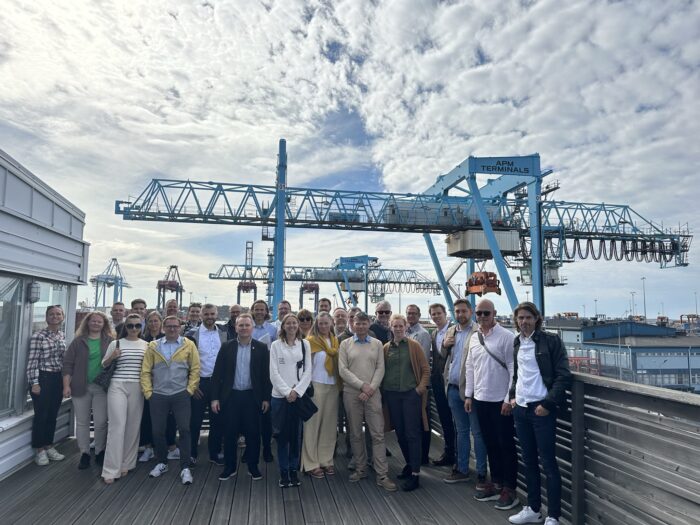The Motus Foundation attended the second Blue Supply Chains Partner meeting, which took place last month in Gothenburg, Sweden. Over two days, featuring a variety of presentations and workshops, Partners discussed the current and upcoming tasks to be accomplished within the project.
The initiative is now well underway, with the involved parties working on the three pillars making up its core body of activities:
- providing greening solutions in ports operations, focused on electrification of handling equipment in ports and terminals
- developing strategies for the implementation of alternative fuel solutions
- setting-up green transport chains with focus on hinterland connectivity in context of combined transport
Prior to turning their attention to presentations and discussions, the Partners had the chance to tour and explore the Port of Gothenburg. It was the perfect occasion to learn more about the Port’s future plans and development ideas.

Future looks busy
After the tour it was time to get down to business. Partners from the Swedish Environmental Institute (IVL) explored a number of questions relevant to creating a viable scenario for green bunkering and charging strategies for ports. These included the assessment of the pace of growth in demand from the side of vessel operators, identification of costs associated with the transformation and the approach to managing these, as well as the need for developing and defining the relevant methodology.
Representatives from Umea Energi presented a brief feasibility study for the use of local green hydrogen in port areas. A market study for green hydrogen fuels in a multimodal perspective (focus: Port of Umea), as well as a study of their production, storage and usage have already been completed. Next steps include carrying out a costs/benefits analysis and the creation of a strategic roadmap for implementation.
Our Partners from the Lithuanian Inland Waterways Authority offered insights on their plan to cut CO2 emissions by starting cargo transportation via inland waterways between the Ports of Klaipeda and Kaunas on the river of Nemunas. The main hero of the story was the concept for an electric tugboat. Works on the technical specifications of the vessel are currently in their final stages and nearing completion.
Electricity was also the name of the game during a presentation by the Port of Skagen, sharing their plans for a mobile shore power system for fish landing-terminals. The project foresees two terminals in total, installed in a movable solution. A completed project would result in a projected CO2 reduction of over 2.500 tonnes per year.
Port of Trelleborg joined the discussion showcasing their three-party project in joint cooperation with the Port of Rostock and Stena Line. The main goal is to improve the rail ferry service between the ports, increasing the use of green transport solutions and boosting green intermodal terminal handling.
The Partners will meet again next year but it doesn’t mean that we’re taking a break. The Blue Supply Chains project is gaining speed with each task accomplished and we’re proud to be able to work with such an engaged and focused group of people.
You can read more about the BSC Project here.


